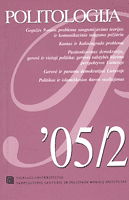Jaunimo politinės organizacijos Lietuvoje: politikų kalvė ar laisvalaikio klubai?
Youth Political Organizations in Lithuania: Schools for Future Politicians or the Partime Clubs?
Author(s): Diana JanušauskienėSubject(s): Politics / Political Sciences
Published by: Vilniaus universiteto leidykla & VU Tarptautinių santykių ir politikos mokslų institutas
Keywords: sociological research of youth political organisations in Lithuania; civil society and political elite in Lithuania
Summary/Abstract: The article aims to present the results of a sociological research of youth political organisations in Lithuania. In this study, youth political organisations are defined as organisations that are affiliated to political parties and share their ideology. Six organisations were researched: the Lithuanian Labour Youth Union, the Lithuanian Social Democratic Youth Union, the Lithuanian Young Centrist Movement, the Young Christian Democratic Organisation, the Young Conservative League, and the Lithuanian Liberal Youth. A survey of the members and interviews with the leaders were accomplished in summer 1999: 17 leaders were interviewed and 171 ordinary members of the organisations were surveyed. In addition, a control group of "established" politicians (members of the Parliament) was included in to the research in order to have a basis for comparison. The group involved the representatives of the "mother" parties (5 leaders of the parties were interviewed and 40 members were surveyed). The basic conclusions of the research concern the functions of youth political organisations as well as the attitudes of the members. As the research data shows, youth political organisations are a significant indicator of an active civil society. Furthermore, they perform an important role in political recruitment, being one of the channels through which youth enters the political parties and, consequently, the political elite. In addition, youth political organisations spread the ideology of their "mother" parties (sometimes they even form ideological views of their younger members); serve as a "school for politicians", on the one hand, and social clubs, on the other hand; they represent youth problems (very often acting as lobby groups); and they educate their members. The activities of youth political organisations do not differ much. The major differences are the ideological affiliation and the dominance of different age groups (e.g. very young liberal youth versus a little bit older young Christian democrats and labour youth). The other important finding is that a significant part of the members of youth political organisations consider seriously the political career (44 proc.-69.6 proc. of the researched members would like to occupy a high post in the Government or local Government in the future; 28 proc.-64.3 proc. of the members would like to become leaders of youth organisation; 16 proc.-37.9 proc. of the members would like to become a leader of the "mother" party; and 6.7 proc.-33.3 proc. hold that they came to the organisations because of the possible political career). Another interesting result concerns the attitudes towards the political opponents: the majority of the members tend to negatively define their political opponents.
Journal: Politologija
- Issue Year: 2002
- Issue No: 1 (25)
- Page Range: 40-73
- Page Count: 34
- Language: Lithuanian

